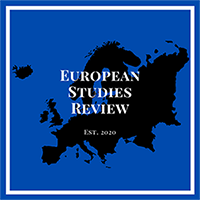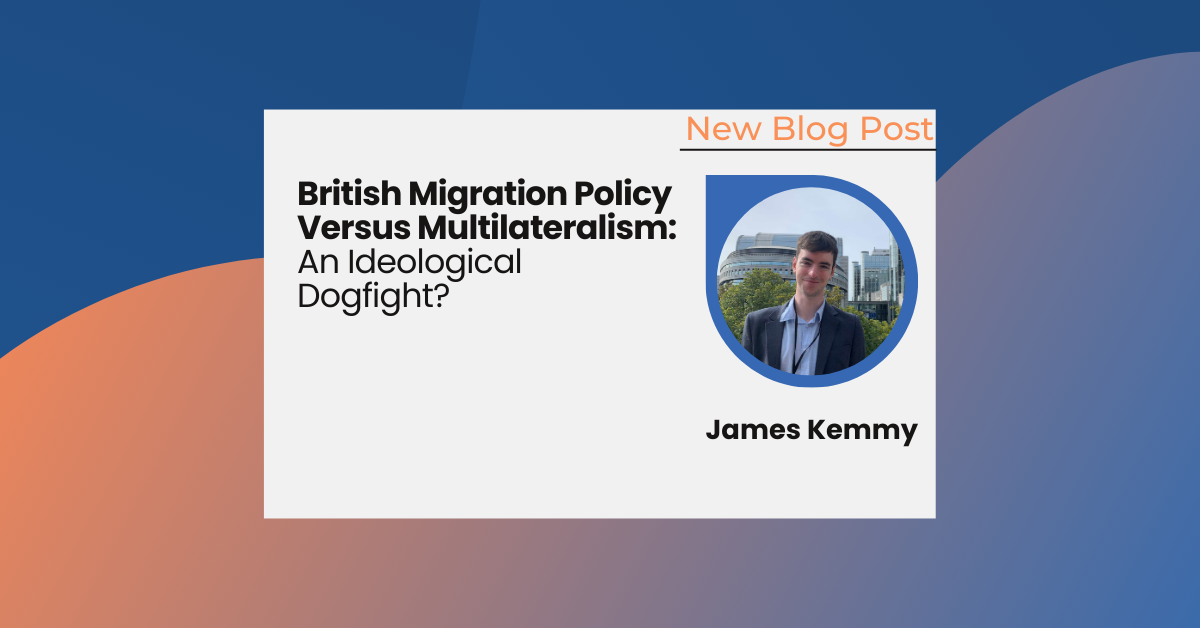By James Kemmy
Regional disintegration, pursued by Britain via Brexit, was notoriously supposed to “Take Back Control” and to realise an ambition of constructing sovereign borders within a contemporary global order. Although the Eurosceptic referendum campaign was largely driven by the promise to cut numbers of arrivals to British shores, migration to the UK has, ironically, never been higher since.
In 2022, net migration came to a record high of 745,000 people, according to the University of Oxford’s Migration Observatory. The parliamentarians who stood most forcefully behind the Brexit project as a means to design a new migration framework now insist on further detachment from international consensus on the issue. In other words, they claim that Britain has not exited forcefully enough to be able to meaningfully tackle the issue of rising cross-border mobility.
Since the withdrawal from the EU was enacted in early 2020, there has been manifest pressure on the Conservative Government to reduce immigration levels, given the state’s supposed new legislative empowerment. However, the five successive home secretaries since 2020, including two intermittent tenures by Suella Braverman, have plainly failed to deliver in this regard. Such stumbling blocks have entailed frequent quarrelling with French authorities over responsibility for asylum seekers in the English Channel and the proliferation of irregular migration from those arriving at Dover on small boats.
Such irregularity is largely due to the systematic lack of functional return agreements with the EU and third countries post-Brexit, something seen as a fatal flaw in Boris Johnson’s withdrawal deal. Enforced and voluntary returns are at an unprecedented low in the UK, dropping from an average of 44,000 annually pre-Brexit, to just 10,000 in 2021.
Although the Covid-19 pandemic did limit the Home Office’s typical capacity to restrict migrant movements, and while the numbers of arrivals generally declined at this time too, such a drop remains notable. In particular, the effort to increase voluntary returns, something consistently promoted since the UK’s “hostile environment” policy (2012), can by no means be viewed as a success. According to a report from the National Audit Office, the Home Office has yet to demonstrate stronger and sustained compliance with immigration law from foreign individuals, calling into question the supposed administrative efficiencies as championed by Brexit proponents.
The most salient feature of the post-Brexit migration framework, however, is the contentious Rwanda asylum plan, which was unanimously struck down by the UK Supreme Court on 15 November last year. This policy, designed by Priti Patel under Johnson’s premiership, aimed to deter non-EU asylum seekers from coming to the UK with the threat of rapid transferral to a ‘safe’ third country upon arrival – Rwanda.
The UK-Rwanda Migration and Economic Development Partnership, along with the Nationality and Borders Act 2022 and the Illegal Migration Act 2023, have been condemned by the UN’s High Commissioner for Human Rights, who expressed that UK migration plans “externalise fundamental obligations to asylum seekers and lack realistic, durable solutions”.
Thus far, the Rwanda scheme has proved an overwhelming headache for the Government, one that has faced legal deadlock and invoked huge expense for the British taxpayer. £140 million has been sent to Rwanda to date, to launch the scheme and to facilitate the necessary infrastructural development in the East African nation. Meanwhile, the UK’s National Audit Office has projected that an excess of £580m could be paid by the British Government by the end of the decade for the scheme’s continuation. The NAO’s report also found that the operational cost of each asylum seeker’s transferral is likely to be approximately £11,000. Yet, still, not one asylum seeker has actually been relocated to Rwanda.
With raucous infighting and “electoral oblivion” forecasted by internal figures, the Tory hard-right insist on further detachment from international migration rules in order to meet their manifesto commitments and salvage some public legitimacy ahead of a general election.
A central point in this political battle concerns the European Convention of Human Rights, an international treaty ratified by the Council of Europe in 1953 to promote democracy and respect for the rule of law. Importantly, the Council of Europe is an organisation that exists outside of the EU’s institutional jurisdiction, being composed of several non-EU members such as Norway, Türkiye, and Ukraine, along with other EU Member States. Although Britain was one of the original signatories of the Strasbourg-based Convention, current debate in London presents the paradoxical question of whether the country should now repudiate the Council’s authority to overhaul the country’s migration rules.
The ECHR has underpinned many pivotal legal developments over previous decades, including the decriminalisation of homosexuality, the abolition of the death penalty, the criminalisation of modern slavery, and, monumentally, the 1998 Good Friday Agreement, which established peace in Northern Ireland after thirty years of sectarian conflict. On multiple occasions over recent months, however, former Home Secretary Suella Braverman has personally diverted from official government positions on ECHR membership. In this regard, Braverman has described it as “a politicised court”, “interventionist”, and one that “treads on the territory of national sovereignty”.
Despite such pressure from the radical wing of his party, Prime Minister Sunak announced a proposal in December whereby Britain will not leave the ECHR, but will, peculiarly, disapply some of its own domestic human rights law to bolster the Rwanda programme’s constitutional feasibility. On balance, this can be seen as a victory for Tory moderates who want to maintain international obligations, and something that angered the radical right factions, represented by the European Research Group, New Conservatives and Common Sense Group. Inevitably, internal relations intensified approaching the vote on this proposal, with firebrands such as Braverman and Robert Jenrick resigning in protest.
Therefore, the Prime Minister now seeks to navigate delicately between the two Conservative camps who are deeply divided on Britain’s cooperation with the Strasbourg court. While Sunak’s plan passed with lukewarm enthusiasm, the Rwanda scheme remains constitutionally murky, with government lawyers warning that it has a “50% chance at best” of being successfully enacted without ECHR dispute. Either way, UK actions to detach themselves from global and regional cooperation on asylum policy have proved to be less than functional, let alone fruitful, thus far.
The latest state of play with this controversial scheme sees a game of parliamentary “ping-pong” being played, whereby the legislation is being tossed between the House of Commons and the House of Lords in an attempt to find consensus on the final wording. Many members of the Lords maintain serious concerns over Rwanda being deemed a safe country, with a recent report from the Foreign, Commonwealth and Development Office finding that more than half the population lives in extreme poverty and malnutrition. Despite this, the Prime Minister remains insistent that the plan will be operational by June, ahead of a potentially seismic general election.
Symbolised by this inflammatory migration debate, the Tory Party currently stands at an ideological crossroads, torn between orthodox conservatism and nationalistic populism, international cooperation and creeping isolationism. Facing a tough electoral season, they will have to reconcile their broad church and present some semblance of political cohesion to the British electorate to challenge Keir Starmer’s ascendant Labour Party.
More broadly, however, future British leadership’s approach to diplomacy and regional relations is crucial. According to Ivan Rogers, the UK’s Former Permanent Representative to the EU, the country has been perceived as obstreperous and dogmatic for some years now, tarnishing its historic brand as a responsible global player and torchbearer for the rule of law. Amending this dwindling international reputation surely ought to be at the top of the agenda for the next British Government, regardless of its political composition.
About the Author
James is a recent graduate of government and political science from Ireland. His writing mainly focuses on contemporary ideology, political strategy and public opinion in salient policy areas like migration and social affairs. James is currently working for a leading political organisation in the European Parliament and is interested in the EU’s unique institutional dynamics.

